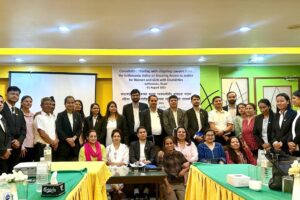
Dec 1, 1975
The purpose of the Review is to focus attention on the problems in regard to which lawyers can make their contribution to society in their respective areas of influence and to provide them with the necessary information and data.
This edition features articles on:
- Human rights in the world:
-International covenants on human rights
-UN Sub-commission on minorities and discrimination
-Baader-Meinhof trials and criminal procedure, by Karin Rose
-Migrant workers, by Frank Russo
-Criminal justice in Africa and Asia, by Saeed El Mahdi
- Book review: “The Trial of Beyers Naudé”
ICJ Review-15-1975-eng (full text in English, PDF)

Jun 1, 1975
Impunidad, crimen de lesa humanidad y desaparición forzada.
ICJ Review-14-1975-eng (La Revista en Español, PDF)

Jun 1, 1975
The purpose of the review is to focus attention on the problems in regard to which lawyers can make their contribution to society in their respective areas of influence and to provide them with the necessary information and data.
This edition features articles on:
- Human rights in the world:
-Mr. Vorster’s political prisoners
-United States policy and human rights
-Human rights, the poor and the legal system, by R. Sackville
-Psychiatry, the law and dissent in USSR, by Clayton Yeo
-Conference on humanitarian law- phase II, by S. Suckow
-Torture and 5th UN Congress on crime prevention, by J. A. Dolan and M. L. Van Den Assum
ICJ Review-14-1975-eng (full text in English, PDF)

May 1, 1975
This book, edited by the ICJ, is a presentation of the trial of the Reverend Dr C. F. Beyers Naudé, the Christian Institute and, by implication, any informed and responsible Christian conscience.
Dr Beyers Naudé affirmed that no one who believes in Jesus Christ should be excluded from any church on the grounds of colour or race, and that the rights to own land where he is domiciled and to take part in the government of a country is part of the dignity of any man.
He was tried for refusing to give certain evidence regarding the Christian Institute. The meticulous records of the trial gradually reverses the situation so that the man in the dock becomes the prosecutor and the prosecutor is in the dock. Here the South African government is put on trial before the court of humanity and history and found guilty by its own testimony. The record of the trial, the appeal, other relevant appeals, and the text of the famous statement Divine or Civil Obedience? are presented in the light on international jurisprudence.
South Africa-trial Beyers Naudé-thematic report-1975-eng (full text in English, PDF)

Apr 1, 1975
Informe del Dr. Heleno Claudio Fragoso, abogado y profesor de derecho penal en la Universidad de Río de Janeiro, sobre La situación de los Abogados defensores en Argentina.
Argentina-defense lawyers-fact-finding mission report-1975-spa (en Español, PDF)









